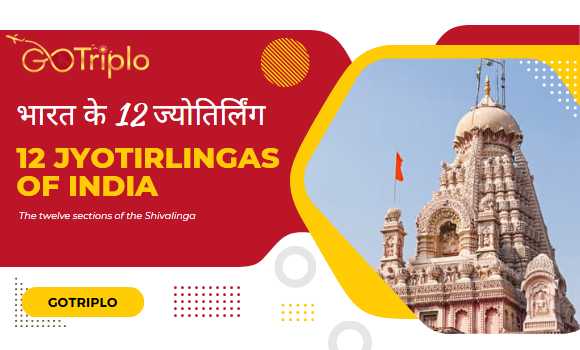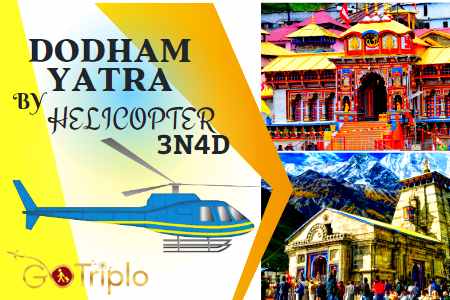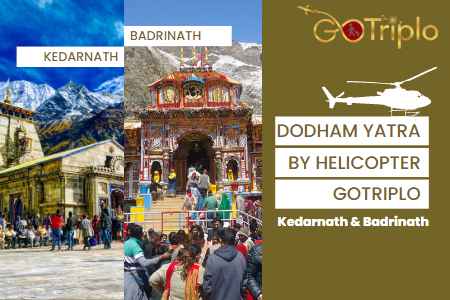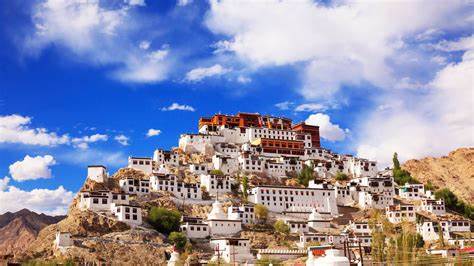
Do you know about the well-known jyotirlinga shrines in India? These temples are dedicated to Lord Shiva, who is revered here in a Lingam, which symbolizes sacred power. According to Shiva Purana, there are 64 original Jyotirlinga shrines in Nepal and India. But only 12 shrines are referred to as the Maha Jyotirlingam due to their extreme sacredness. These places are located in India, stretching from North to South.
"Jyoti"
translates to radiance or light, while "linga" is a symbol. According
to Hindu mythology, there are twelve important temples, known as the Dwadash
Jyotirlinga, which are revered throughout India by devotees of Shiva.
This
article looks into the twelve iconic jyotirlinga temples in India, their
locations, and what makes them important to India's spiritual heritage. It also
examines how these incredibly impressive structures have endured for centuries
and why devotees still travel great distances to visit them.
The
Somnath Jyotirlinga is one of the twelve revered temples of Lord Shiva in
India. It is believed to have been visited by the Lord himself, making it a
special pilgrimage site for the devotees. 'Jyotirlinga' means 'column or pillar
of light', and 'stambha' symbolically stands for its everlasting presence.
This
story symbolized the origin of Lord Shiva as the supreme god when an argument
began between Lord Brahma and Lord Vishnu. Lord Shiva then showed himself as a
column of light and asked them to find either end, but neither could do it,
thus proving that Shiva was indeed superior.
The
Somnath Temple is located at Prabhas Patan, near Veraval in Saurashtra on
Gujarat's western coast. It is said to be one of India's oldest temples and has
been repeatedly ravaged by attackers. Yet, these devoted devotees have
continuously reinstalled it with great reverence.
This
sacred shrine to Lord Shiva still stands tall and strong, garnering attention
from thousands of pilgrims who flock to it from all over India annually to pay
their respects.
Interesting Facts
The
Somnath Jyotirlinga is also known for its unique location. It is built in such
a way that there is no land in a straight line to its south till Antarctica. It
makes it a sea-protected site and gives it an extra layer of protection from
invaders. Additionally, inscriptions on one of its pillars date back to 7 AD,
making it one of the oldest temples in India. All these facts make this temple
an interesting place to visit and learn about its rich history and culture.
The
Mallikarjuna Jyotirlinga Temple is one of the twelve revered shrines of Lord
Shiva in Madhya Pradesh, India. It is located in Srisailam, Andhra Pradesh, and
is considered one of the most powerful Jyotirlingas. The word 'Jyotirlinga'
means 'column or pillar of light', and it symbolizes no beginning or end to
Lord Shiva's power.
According
to Hindu mythology, when Lord Brahma and Lord Vishnu argued about who was the
supreme god, Lord Shiva appeared as a column of light and asked each one to
find the end. Neither could do it, thus proving that he was the supreme god.
Devotees
have revered the Mallikarjuna Jyotirlinga for centuries due to its spiritual
significance. People from all over India come here to seek blessings from Lord
Shiva and offer their prayers at this sacred shrine. The temple complex also
houses several other shrines dedicated to various gods and goddesses, such as
Goddess Parvati, Ganesh, Kartikeya, Nandi etc., making it a popular pilgrimage
site for Hindus. Devotees often perform special pujas from here on.
Interesting Facts
The
legend of Mallikarjuna Jyotirlinga also has an interesting story associated
with it. It is said that Goddess Parvati fought the demon Mahishasura by
transforming herself into a bee, which eventually led to his defeat. It makes
the temple even more special for devotees who come here to seek blessings from
Lord Shiva and Goddess Parvati. People from all over India come here to offer
their prayers and seek divine intervention.
The
Mahakaleshwar temple is a magnificent structure located in Ujjain, India. It
has been built in Maratha, Bhumija and Chalukya architectural styles, with five
levels, one of which is underground. The temple houses several statues of Lord
Shiva and his family members. On the second floor above the Mahakaleshwar linga
is the Omkareshwara linga. On the third floor is an image of Nagchandreshwar –
with Lord Shiva and Parvati seated on a ten-hooded snake and surrounded by
other statues. The temple also features a tall spire (shikhara) with intricate
and beautiful carvings.
It is
believed that a five-year-old boy, Srikar set up Mahakaleshwar Jyotirlinga after
inspiring by the devotion of King Chandrasena of Ujjain.
Interesting Facts
This
Jyotirlinga is even more special because it does not require mantra shakti for
power like the other lingas and moorthies (statues). Since it is a
self-originated linga, it derives power on its own. It makes Mahakaleshwar
Jyotirlinga one of the most powerful shrines in India, with devotees from all
over the country flocking to seek blessings from Lord Shiva.
The Omkareshwar
Jyotirlinga Temple is one of India's most revered and sacred shrines. It is
located on the enchanting island of Mandhata, which lies at the confluence of
the Kaveri and Narmada rivers. The shape of this island resembles the sacred
symbol 'OM’, making it even more divine. The temple has Nagara-style
architecture with intricate carvings and beautiful balconies and columns of
various shapes. The Jyotirlinga installed on the base floor remains immersed in
water, adding to its spiritual significance.
Visiting
this temple is an experience like no other, as devotees can feel a sense of
peace and serenity here. People come from all over India to seek blessings from
Lord Shiva, who is believed to be present in this form of Jyotirlinga. This
temple also reminds us that we should always strive for harmony between our
inner self and nature, just like how the two rivers meet here peacefully.
Interesting Facts
During
the 11th century, Mohd Ghazni attacked the Omkareshwar temple. Aurangzeb was
held responsible for destroying the Jyotirlingas in India. Aungha Nath, Kashi
Vishwanath and Tribakeshwar are some of the destroyed temples during that
period.
The
Vaidhyanath Jyotirlinga Temple (Baba Baidyanath Temple) in Deoghar is one of
the most revered temples in India. It is a part of the 22 temples devoted to
different Gods and Goddesses, with Lord Shiva being the supreme one. The main
temple of Vaidhyanath faces east and stands tall at 72ft.
According
to religious notes, it was built by Vishwakarma, the Gods' architect. There
isn't much history that indicates any king or person who built this temple, but
it has been visited since the age of Rama, the then-king of Ayodhya.
Bhimashankar
Temple is a popular tourist destination located in Khed Taluka. It is situated
at an elevation of 3500 feet above sea level and is home to one of the
prominent Jyotirlingas in India. The strategic location and stunning landscape,
including rolling hills, verdant rainforests, and lush greenery, make it an
ideal spot for trekkers, hikers, mountain climbers, pilgrims, photographers,
and holidaymakers.
The
Jyotirlinga is a sacred shrine of Lord Shiva, believed to have been visited by
the Lord himself. There are twelve such shrines in India, each symbolizing the
power and glory of Lord Shiva. The word ‘Jyotirlinga’ literally means ‘column
or pillar of light’, representing that there is no beginning or end to the
divine power of Lord Shiva.
The story
behind these shrines dates back to when Lord Brahma and Lord Vishnu argued
about who was the supreme god. Lord Shiva appeared as a column of light to
settle this dispute and asked them to find its ends. Neither could do so, thus
proving that no one can measure the greatness of God. These shrines are so
revered by devotees all over India, especially Rameshwaram Jyotirlinga, which
is located in Tamil Nadu.
The
Nageshwar Jyotirlinga is one of the twelve revered shrines of Lord Shiva in
India. It is located in Dwarka, Gujarat and is also known as 'Nagnath' or
'Nageshwar Mahadev'. The temple is believed to have been built by Ravana, the
demon king from Hindu mythology. According to legend, Ravana worshipped Lord
Shiva here and was blessed with immense power.
The
Nageshwar Jyotirlinga symbolizes the formless aspect of Lord Shiva and is said
to be a manifestation of his divine energy. It represents no beginning or end
to his power and glory. Devotees believe that worshipping at this shrine will
bring them closer to Lord Shiva and help them attain spiritual liberation.
The Kashi
Vishwanath Temple is one of the most revered temples in India, located on the
banks of the river Ganges in Uttar Pradesh. It is dedicated to Lord Vishwanath,
Ruler of the Universe and has a documented history of over 3500 years. Every year
during the month of Shravan, grand celebrations are held in this holy town of
Varanasi. On each Monday of this month, different decorations are done for Lord
Shiva and other deities associated with him. Starting with the decorations of
Lord Shiva on the first Monday, it culminates with the decorations of Shri
Rudrakshay on the fourth Monday.
Trimbakeshwar,
Maharashtra, is a religious shrine that many Hindus revere. It is believed to
embody Lord Brahma, Lord Vishnu and Lord Rudra in its three faces. The temple
is celebrated with great fervour during the Shravan festival dedicated to Lord
Shiva. Special ornamentation of the deity takes place on Naag Panchami and full
moon day or Narali Poonam. Furthermore, the procession of oxen is carried out
on the no moon day.'
The
temple complex also houses several other temples, such as the Kalaram Temple,
Ganga Mai Temple, Vithoba Temple and more. There are also various ghats along
the Godavari River, where devotees take a holy dip before offering their
prayers at Trimbakeshwar. The temple complex also has an ancient Jyotirlinga,
considered one of the twelve Jyotirlingas in India. People from all over India
come here to seek blessings from Lord Shiva and experience spiritual bliss.
The
Kedarnath Shivling is an important symbol of Lord Shiva, located in the Kedar
Khand region of India. This temple has been a pilgrimage site for centuries and
is known for its spectacular views of snow-capped mountains and lush valleys.
It is one of four pilgrimage sites that form the Char Dham Yatra, which
includes Chota Char Dam, Gangotri, Yamunotri, and Badrinath.
Kedarnath
Yatra is a significant part of the Chardham Yatra by helicopter and covered
after Yamunotri and Gangotri.
Grishneshwar
Jyotirlinga is located at Verul, near Ellora Caves in Aurangabad district of
Maharashtra. The temple is dedicated to Lord Shiva and is believed to have been
built by the Pandavas during their exile period. The temple has a unique
architecture with a four-storeyed structure and a shikhara (dome) on top.
The
Grishneshwar Jyotirlinga symbolizes Lord Shiva's presence in the form of an
infinite pillar of light, which neither Brahma nor Vishnu could find the end
of. This pillar of light represents that there is no beginning or end to Lord
Shiva's power and glory. Devotees from all over India come here to seek
blessings from Lord Shiva and experience his divine grace.
Jyotirlingas
are in India have always been the center of attraction for the Lord Shiva
devotees. These twelve Jyotirlingas are located in different parts of India and
each one has its own unique history and significance. From the Kashi Vishwanath
Temple to Grishneshwar, these temples have been revered by Hindus for
centuries. People from all over India come here to seek blessings from Lord
Shiva and experience spiritual bliss.

Char Dham Yatra by Helicopter 2024 | Luxury Packages - Gotriplo :Blueheights Luxury Trips Pvt Ltd
CHAR DHAM YATRA BY HELICOPTER
Duration :5N / 6D From 185000

VIP Do Dham Yatra by Helicopter 3N4D: Kedarnath & Badrinath
DO-DHAM YATRA BY HELICOPTER 3N4D
Duration :3N / 4D From 130000

Same Day Do Dham Helicopter Tour Package from Dehradun, Badrinath and Kedarnath Tour Packages
SAMEDAY DODHAM YATRA BY HELICOPTER
Duration :1N / 2D From 100000

Char Dham Yatra by Road, Book Online Kedarnath, Badrinath, Gangotri And Yamunotri Tour Packages
CHARDHAM YATRA 8N9D BY ROAD
Duration :8N / 9D From 50000

Explore Greece with These Amazing Tour Packages
Best of Greece
Duration :7N / 8D From 0

ladakh Package
Panaromic ladakh Ex Delhi
Duration :6N / 7D From 60650
Get Customized Travel Quotes from Trusted Travel Agents